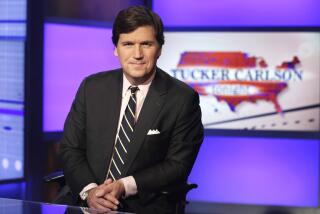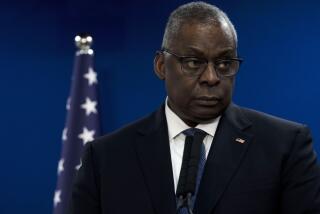Kremlin Watchers Wonder Who’s Running Russia
MOSCOW — Russian President Boris N. Yeltsin has been absent from the public eye--with the exception of an American vice presidential visit--for a month now, and aides continue to deny that he is sick or on vacation. That has left Kremlin watchers ever more mystified as to who is running Russia.
Decrees are issued in Yeltsin’s name in the day-to-day work of taxing and spending. Messages from the president are sent around the world, offering praise to Olympic medal winners and heartfelt condolences to the families of terrorism victims. Ceremonies at which the head of state is expected are attended by Prime Minister Viktor S. Chernomyrdin.
Yeltsin has been in seclusion at the Barvikha spa and hospital complex outside Moscow since June 29, when he retreated during the final days of a high-profile reelection campaign to recuperate from what officials described as exhaustion. But since he suffered two mild heart attacks last year that caused him to miss two months of work in the Kremlin, suspicion is rife among analysts that the 65-year-old president is afflicted with more than fatigue.
Russians are largely unruffled by their leader’s disappearing act--they grew accustomed to being in the dark about behind-the-scenes power plays during the Soviet-era succession of frail and reclusive Communist Party rulers.
“Yeltsin will come back to Moscow only on Inauguration Day,” one source in the Kremlin administration confirmed Sunday, referring to the Aug. 9 ceremonies. “But there is no need to worry about his health. He is OK. He just needs some rest and to stay out of the office.”
Diplomats say Yeltsin is being kept on a relaxation regime at Barvikha to preserve his strength for the inauguration, which will put him in the international spotlight.
The only foreign dignitary to have been accorded access to Yeltsin over the past month was Vice President Al Gore, who deemed the Russian president “in good health” and “actively engaged” in the affairs of state.
But U.S. policy has long been to put the brightest face possible on Yeltsin’s abilities, because a return to Communist power here would be perceived as a major failure by the leaders of established democracies.
With Kremlin insiders and Western dignitaries sticking by their not-to-worry stories, those trying to assess the true nature of Yeltsin’s health can only judge from what they see and speculate as to who is really in charge.
In carefully edited videotape of Yeltsin’s few meetings with government figures, the president has looked pale and at times disoriented, fueling speculation that he has suffered either another bout of myocardial ischemia or a mild stroke.
A more fit president might have been expected to attend Sunday’s gala celebration of the Russian navy’s 300th birthday. But Chernomyrdin was again sent to carry the Kremlin flag in St. Petersburg. Similarly, the prime minister is expected to represent Russia at the closing ceremonies of the Olympic Games in Atlanta.
As to who is keeping the machinery of state in operation, Kremlin analysts say the task is divided among several key figures, with Chernomyrdin and new chief of staff Anatoly B. Chubais foremost among them.
“Yeltsin left without leaving anybody in charge. This is very typical of him,” observed Andrei V. Vasilevsky, chief analyst at the Panorama news agency. “Affairs are just going along in their natural way, without any major interference. Chernomyrdin and Chubais can be said to be those in charge, but in fact there is really nobody other than Yeltsin.”
The president’s daughter, Tatiana Dyachenko, has emerged as an influential force and has been acting as liaison between her father and those in the Kremlin. Vasilevsky said Dyachenko was responsible for returning Chubais to high office, despite his broad unpopularity with Russians, who believe that the former privatization chief failed to fairly redistribute the public wealth.
Chubais was probably the initiator of last week’s decree ordering tariffs on goods imported by “shuttle traders,” millions of individuals who travel abroad regularly to buy and carry back huge quantities of cheap products for resale. The 41-year-old economist has publicly criticized the leadership’s approach to collecting taxes and has warned that, without correction, the current policies could drive the economy into ruin.
Security Council chief Alexander I. Lebed succeeded in winning Yeltsin’s support for his choice of defense minister but has done little else since his splashy late-June appointment. Lebed is supposed to be fighting corruption and reforming the army but has failed to even arrange a meeting with the Chechen rebels with whom he has vowed to make peace.
Presidential press secretary Sergei K. Medvedev probably has the most frequent contact with Yeltsin, the administration source said, but that is mostly conducted by telephone, and the spokesman is not believed to serve as an advisor. Medvedev, by his own admission, is not in the “inner circle,” and acts mostly as the approved information channel for the still-secretive Kremlin.
One of the few Cabinet ministers aside from Chernomyrdin who has had access to Yeltsin is Foreign Minister Yevgeny M. Primakov, who briefed the president Saturday about the current state of ties with Southeast Asian nations.
As Moscow plods along at its summer snail’s pace, and all pending legislation awaits the October return of the vacationing Duma, the lower house of parliament, some observers argue that no one needs to be firmly in charge at the moment. “Yeltsin still has control of the nuclear box as far as anyone can determine,” one relatively unconcerned Western diplomat said. “Other than that, this country seems able to carry on under autopilot.”
(BEGIN TEXT OF INFOBOX / INFOGRAPHIC)
Tracking Boris
Russian President Boris N. Yeltsin has been in seclusion for a month, but the latest disappearing act is hardly new, as this timeline shows.
September 1991: Two meetings with Russian Federation lawmakers are canceled when Yeltsin suffers a bout of heart trouble.
October 1991: Yeltsin takes a 17-day seaside vacation despite major political developments. Aides explained then that he is suffering from fatigue.
January 1992: Yeltsin abruptly cancels all his appointments for two days and leaves Moscow. Later in the month, Yeltsin decides not to join Secretary of State James A. Baker III for a traditional news conference following U.S.-Soviet or U.S.-Russian meetings.
September 1994: Yeltsin fails to get off a plane at Shannon airport to meet Irish Prime Minister Albert Reynolds.
March 1995: Yeltsin abandons a cross-country tour and retreats to a secluded dacha.
April 1995: Yeltsin misses Russian Orthodox Easter services.
July 1995: Yeltsin abruptly cancels a state visit to Norway and all other activities on his schedule after being hospitalized with heart trouble. He does not return to work for almost a month after what is described later as a mild heart attack.
October 1995: Two days after returning from a U.S. visit, Yeltsin is again hospitalized for a month of treatment for heart disease.
June 1996: While campaigning, Yeltsin cancels appearances three times within a week, sparking speculation about his health in the homestretch of his reelection drive.
July 1996: Yeltsin abrutly postpones a meeting with U.S. Vice President Al Gore but reschedules the meeting the next day amid deepening concerns about his health.
Source: Los Angeles Times files
More to Read
Sign up for Essential California
The most important California stories and recommendations in your inbox every morning.
You may occasionally receive promotional content from the Los Angeles Times.











